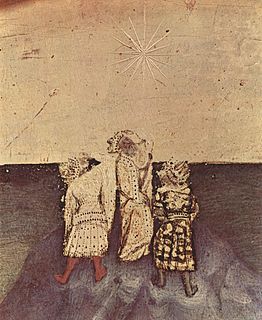
Matthew 2:10 is the tenth verse of the second chapter of the Gospel of Matthew in the New Testament. The magi, dispatched by King Herod, have been shown the location of the infant Jesus by the Star of Bethlehem. In this verse they react to this.

Matthew 3:9 is the ninth verse of the third chapter of the Gospel of Matthew in the New Testament. The verse describes an incident where John the Baptist berates the Pharisees and Sadducees. He has previously called them a brood of vipers and warned them of the wrath to come and has urged them to repent. In this verse he warns that their links to Abraham will not save them.

Matthew 3:11 is the eleventh verse of the third chapter of the Gospel of Matthew in the New Testament. The verse occurs in the section relating the preachings of John the Baptist. In this verse he predicts that he will be followed by someone much greater than himself. The main theme of this verse is that John will soon be supplanted by a much greater figure and that John's water baptism is just a preparation for the much greater baptism by fire and spirit that will occur under the second coming of the Christian messiah Jesus, an original Christian concept that, according to Jewish scholars, lacks any fundament in the Hebrew scripture.

Matthew 5:26 is the twenty-sixth verse of the fifth chapter of the Gospel of Matthew in the New Testament and is part of the Sermon on the Mount. Jesus has just warned that if you do not reconcile with your enemies a judge is likely to throw you in jail. In this verse Jesus mentions that your debts must be paid completely before one can leave.

Matthew 6:2 is the second verse of the sixth chapter of the Gospel of Matthew in the New Testament and is part of the Sermon on the Mount. This verse continues the discussion of how even good deeds can be done for the wrong reasons.

Matthew 6:4 is the fourth verse of the sixth chapter of the Gospel of Matthew in the New Testament and is part of the Sermon on the Mount. This is the final verse of the Sermon's discussion of alms giving.

Matthew 6:5 is the fifth verse of the sixth chapter of the Gospel of Matthew in the New Testament and is part of the Sermon on the Mount. This verse opens discussion on the proper procedure for praying.
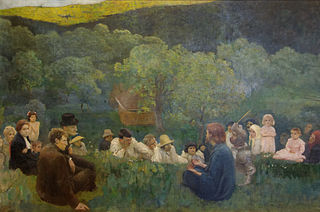
Matthew 6:25 is the twenty-fifth verse of the sixth chapter of the Gospel of Matthew in the New Testament and is part of the Sermon on the Mount. This verse shifts the discussion from one of money to one of worry.
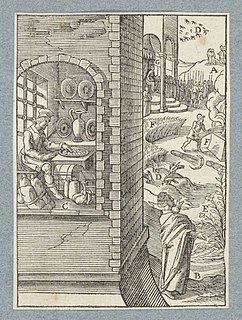
Matthew 6:26 is the twenty-sixth verse of the sixth chapter of the Gospel of Matthew in the New Testament and is part of the Sermon on the Mount. This verse continues the discussion of worry about material provisions. In this verse Jesus tells his followers not to be anxious about food, but to rely on God as the birds, who are worth far less than people, are fully provided for.

Matthew 6:28 is the twenty-eighth verse of the sixth chapter of the Gospel of Matthew in the New Testament and is part of the Sermon on the Mount. This verse continues the discussion of worry about material provisions.
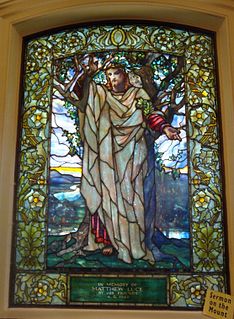
Matthew 6:30 is the thirtieth verse of the sixth chapter of the Gospel of Matthew in the New Testament and is part of the Sermon on the Mount. This verse continues the discussion of worry about material provisions.

Matthew 6:33 is the thirty-third verse of the sixth chapter of the Gospel of Matthew in the New Testament and is part of the Sermon on the Mount. This verse continues the discussion of worry about material provisions.

Matthew 6:34 is “Therefore do not worry about tomorrow, for tomorrow will worry about itself. Each day has enough trouble of its own.” It is the thirty-fourth, and final, verse of the sixth chapter of the Gospel of Matthew in the New Testament and is part of the Sermon on the Mount. This verse concludes the discussion of worry about material provisions.

Matthew 7:9 is the ninth verse of the seventh chapter of the Gospel of Matthew in the New Testament and is part of the Sermon on the Mount. This verse presents the first of a pair of metaphors explaining the benefits of prayer.
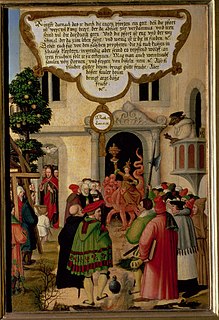
Matthew 7:15 is the fifteenth verse of the seventh chapter of the Gospel of Matthew in the New Testament and is part of the Sermon on the Mount. This verse begins the section warning against false prophets.

Matthew 7:16 is the sixteenth verse of the seventh chapter of the Gospel of Matthew in the New Testament and is part of the Sermon on the Mount. This verse continues the section warning against false prophets.

The Birds of the Air is a discourse given by Jesus during his Sermon on the Mount as recorded in the Gospel of Matthew and the Sermon on the Plain in the Gospel of Luke in the New Testament. The discourse makes several references to the natural world: ravens, lilies and moths are all mentioned.

Matthew 7:19 and Matthew 7:20 are the nineteenth and twentieth verses of the seventh chapter of the Gospel of Matthew in the New Testament and are part of the Sermon on the Mount. The verses continue the section warning against false prophets.

Matthew 7:21 is the twenty-first verse of the seventh chapter of the Gospel of Matthew in the New Testament and is part of the Sermon on the Mount. This verse continues Jesus' warning against false prophets.

Matthew 7:22 is the twenty-second verse of the seventh chapter of the Gospel of Matthew in the New Testament and is part of the Sermon on the Mount. This verse continues Jesus' warning against false prophets.




















